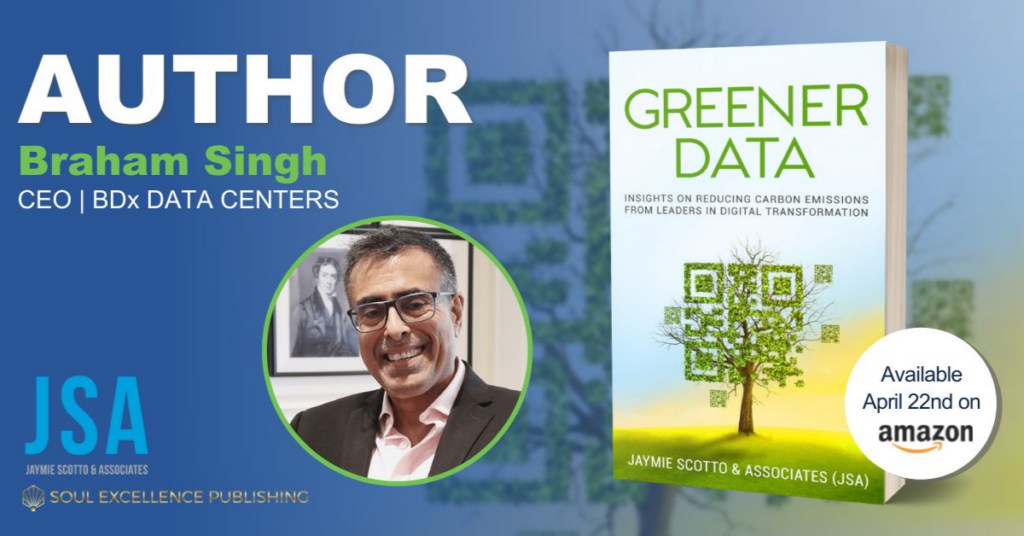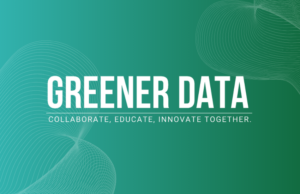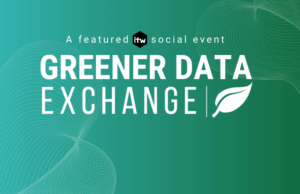
GREENER DATA Author Spotlight
Braham Singh, CEO at Big Data Exchange (BDx)
Singh is a contributing author to the Amazon Best Seller, Greener Data: Actionable Insights from Industry Leaders that debuted on Earth Day – April 22, 2022.
What does being a part of the Greener Data movement mean to you?
Being a part of Greener Data means pushing the boundaries of the sustainability conversation in our industry and challenging all of us to collectively do more. We have to acknowledge the fact that the data center community is responsible for using a significant amount of power. Because of that, sustainability needs to be at the forefront of everything we do.
I’m excited to be a part of this meaningful movement and to offer a tool that can help data centers and other sectors (more on that later in this article).
As the digital infrastructure community continues to look for ways to mitigate the climate crisis and become more sustainable, is there a particular initiative you feel most inspired by?
The inspiration for my chapter, and the reason I became even more passionate about the topic, is the lack of accuracy and transparency across the growing multi-billion-dollar carbon credit trade industry. Since this industry really started taking off, we’ve seen little reduction in greenhouse gas emissions. My chapter is about the challenges and complexity of carbon credits and how technology can sort out the pain points in carbon management. The best way to do that is to digitize it, and that inspires me.
We’ll come back to your chapter in a moment. But we know Greener Data isn’t your first writing engagement. Can you tell us more about your other writing projects and how you got into the art of storytelling?
I’ve wanted to write for as long as I can remember. It took me nearly 10 years to write and publish my first novel, Bombay Swastika, but the investment in time and effort was well worth it. At one point, I turned my love of writing into action and just started getting it done. I’m proud to say I’ve written two books, and I’m working on my third now.
Bombay Swastika follows the real-life story of a German Jew who stayed in Bombay after WWII. Even though he escaped Nazi Germany, trouble followed him to India.
My second novel, Her Browser History, is scheduled for publication next year, and I’m exploring my third novel now. The Little Eunuch is a love story based in China that moves between the 230 B.C. rule of the First Emperor Shi Huangdi and the late 1970’s.
Now let’s talk more about your chapter in Greener Data. You don’t hold back when talking about how the carbon credit industry needs to be held to a higher standard. Why is this something you’re passionate about?
I start out my chapter with a strong statement that conveys how I feel about the carbon credit industry:
It’s no secret that sustainability is a global emergency. As each year passes by, the climate crisis intensifies, and so does the need to reduce the carbon footprint of enterprises and, by all accounts, data centers. Becoming sustainable is more than a corporate initiative or Earth Day pledge. More needs to be done. Actions need to be taken. Greenwashing needs to end.
In particular, I’m passionate about that last sentence. I contributed an article on this very subject to Impakter earlier this year that dives deeper into this, but I’ll briefly explain here. The various carbon exchanges and bodies administering carbon credits and Renewable Energy Certificates (RECs) currently rely on third-party consultants to validate credit and offset claims. This human factor is cumbersome, expensive, and prone to conflicts of interest. It is also known to be error-ridden, and double counting is a significant problem. This broken process helps no one. The industry doesn’t get cleaner by leveraging inaccurate information. In my chapter, I talk more about the recent launch of 360°View, a hybrid infrastructure management platform for managing mission-critical infrastructure whether in your data center, in a colocation facility, or in the cloud. 360°View provides users with a solution to track and measure carbon accurately 24x7x365 with zero human intervention. On the back end, 360°View can either digitally submit applications to traditional carbon exchanges or become a trusted node in any carbon token blockchain. It provides intelligent and predictive management of capacity, power, and assets to enable a more sustainable future. It is cloud-based and leverages blockchain technology. The latest iteration of 360°View measures and reduces an organization’s carbon footprint and is vendor and data center agnostic. The platform delivers in-depth insights and visibility anywhere, anytime, and from any device.
In your Greener Data chapter, you also shed light on ocean data centers. Can you give us a preview of this underwater concept you’re working on?
This is exciting stuff! We’re working with National University of Singapore’s Faculty of Engineering (NUS Engineering), and Sembcorp Marine to develop sustainable ocean data centers. NUS Engineering is looking at using seawater to power and cool offshore data centers using its patented liquid cooling technology. Seawater happens to be the world’s most abundant resource, so putting it to work for us in this way is truly groundbreaking. It won’t be easy. There are enough corrosion and environmental challenges to boggle the mind. But what fun if we come up with the simple and elegant solution we envisage. BDx will provide the data center arrangement as well as the technical proposal and operational strategy, and Sembcorp Marine will contribute an offshore platform solution.
BDx recently moved its global headquarters from Hong Kong to Singapore. How does this fit into the company’s own Greener Data center plans?
We moved to Singapore not just because of the ease of travel from there in these times of COVID, but also because it is the perfect hub for data centers in this region. Besides being Asia’s epicenter of sustainability-related initiatives, it also consistently tops lists for having one of the highest qualities of life in Asia, and so the team loves it. In addition, Singapore has a dynamic technology community that I’m excited about being closer to.
Professionally, those who know the data center industry know that Singapore recently began lifting a moratorium on data center builds that was in place while the government explored more sustainable ways to move the industry forward. Part of the reason BDx packed up our global HQ and moved to Singapore was to be a part of the solution and work diligently and hands-on with public entities to explore alternate ways to continue innovation and smart initiatives. At the same time, it’s critical to work towards building a more sustainable model in Singapore that can be applied to new and emerging markets. We’re really excited to be there and can’t wait to dive deeper into local partnerships.
Click here to listen to Braham talk about his chapter in the book and more in a special Greener Data episode of JSA’s Data Movers podcast.
Follow the Greener Data movement on LinkedIn with the hashtag #GreenerData. Purchase your copy of Greener Data on Amazon.






